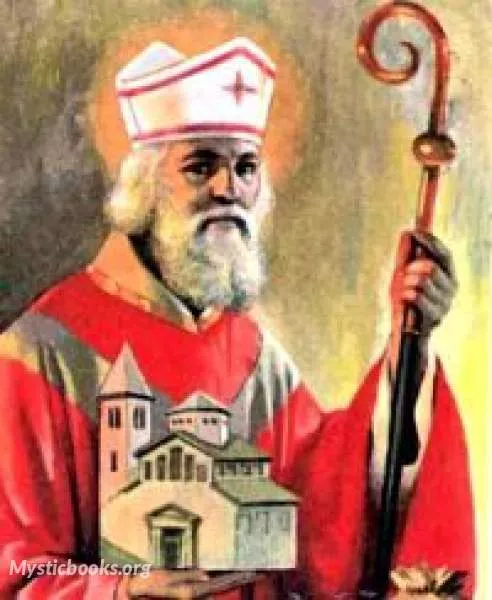
Timeline
Title
Country/Nationality
Saint Ambrose
Ambrose venerated as Saint Ambrose, was the Bishop of Milan, a theologian, and one of the most influential ecclesiastical figures of the 4th century.
Ambrose was serving as the Roman governor of Aemilia-Liguria in Milan when he was unexpectedly made Bishop of Milan in 374 by popular acclamation. As bishop, he took a firm position against Arianism and attempted to mediate the conflict between the emperor Theodosius I and the usurper Magnus Maximus. Tradition credits Ambrose with promoting "antiphonal chant", a style of chanting in which one side of the choir responds alternately to the other, as well as with composing Veni redemptor gentium, an Advent hymn. He also had notable influence on Augustine of Hippo (354-430).
Western Christianity identified Ambrose as one of its four traditional Doctors of the Church. He is considered a saint by the Catholic Church, Eastern Orthodox Church, Anglican Communion, and various Lutheran denominations, and venerated as the patron saint of Milan.
Ambrose was born into a Roman Christian family about 339 and was raised in Gallia Belgica, the capital of which was Augusta Treverorum. His father is sometimes identified with Aurelius Ambrosius, a praetorian prefect of Gaul; but some scholars identify his father as an official named Uranius who received an imperial constitution dated 3 February 339. His mother was a woman of intellect and piety and a member of the Roman family Aurelii Symmachi, and thus Ambrose was cousin of the orator Quintus Aurelius Symmachus.
About the year 354 Ambrosius, the father, died, whereupon the family moved to Rome. There he studied literature, law, and rhetoric. He then followed in his father's footsteps and entered public service. Praetorian Prefect Sextus Claudius Petronius Probus first gave him a place in the council and then in about 372 made him governor of Liguria and Emilia, with headquarters at Milan. In 286 Diocletian had moved the capital of the Western Roman Empire from Rome to Mediolanum (Milan).
Ambrose was the Governor of Aemilia-Liguria in northern Italy until 374, when he became the Bishop of Milan. Ambrose was a very popular political figure, and since he had been the Governor in the effective capital in the Roman West, he was a recognizable figure in the court of Valentinian I.
In the late 4th century there was a deep conflict in the diocese of Milan between the Nicene Church and Arians. In 374 the bishop of Milan, Auxentius, an Arian, died, and the Arians challenged the succession. Ambrose went to the church where the election was to take place, to prevent an uproar, which was probable in this crisis. His address was interrupted by a call, "Ambrose, bishop!", which was taken up by the whole assembly.
Ambrose was known to be Nicene Christian in belief, but also acceptable to Arians due to the charity shown in theological matters in this regard. At first he energetically refused the office, for which he was in no way prepared: Ambrose was neither baptized nor formally trained in theology. Upon his appointment, Ambrose fled to a colleague's home seeking to hide. Upon receiving a letter from the Emperor Gratian praising the appropriateness of Rome appointing individuals evidently worthy of holy positions, Ambrose's host gave him up. Within a week, he was baptized, ordained and duly consecrated bishop of Milan.
As bishop, he immediately adopted an ascetic lifestyle, apportioned his money to the poor, donating all of his land, making only provision for his sister Marcellina (who had become a nun). This raised his popularity even further, giving him considerable political leverage over even the emperor. Upon the unexpected appointment of Ambrose to the episcopate, his brother Satyrus resigned a prefecture in order to move to Milan, where he took over managing the diocese's temporal affairs.
In 383 Gratian was assassinated at Lyon, France, and Paulinus of Nola, who had served as governor of Campania, went to Milan to attend the school of Ambrose.
In April 393 Arbogast, magister militum of the West and his puppet Emperor Eugenius, marched into Italy to consolidate their position in regard to Theodosius I and his son, Honorius, whom Theodosius had appointed Augustus to govern the western portion of the empire. Arbogast and Eugenius courted Ambrose's support by very obliging letters; but before they arrived at Milan, he had retired to Bologna, where he assisted at the translation of the relics of Saints Vitalis and Agricola. From there he went to Florence, where he remained until Eugenius withdrew from Milan to meet Theodosius in the Battle of the Frigidus in early September 394.
Soon after acquiring the undisputed possession of the Roman Empire, Theodosius died at Milan in 395, and two years later (4 April 397) Ambrose also died. He was succeeded as bishop of Milan by Simplician. Ambrose's body may still be viewed in the church of Saint Ambrogio in Milan, where it has been continuously venerated – along with the bodies identified in his time as being those of Saints Gervase and Protase.
Books by Saint Ambrose

On the Duties of the Clergy
Aurelius Ambrosius was a fourth century cleric who rose to become the Archbishop of Milan in 374 AD. His father was a powerful Roman general and the prefect of Gaul. His brother and sister were also consecrated as saints by the Catholic Church. As an...

Concerning Virgins
Concerning Virgins is a series of letters; St. Ambrose wrote to his sister, Manellia, These, perhaps Ambrose's earliest writings, were written in 377 CE. Written in a rather light-handed non-technical style they appear as ethical guides to women who...

On the Death of Satyrus and On the Belief in the Resurrection
Two related addresses occasioned by the unexpected death of Ambrose's brother Satyrus: On the Death of a Brother (De excessu fratris Satyri) and On the Belief in the Resurrection.

On Virginity (De Virginitate)
This book is a treatise on the excellence of virginity by Saint Ambrose, a fourth-century bishop and theologian. Ambrose argues that virginity is a superior state to marriage, and he exhorts young women to embrace it. He contends that virginity incre...